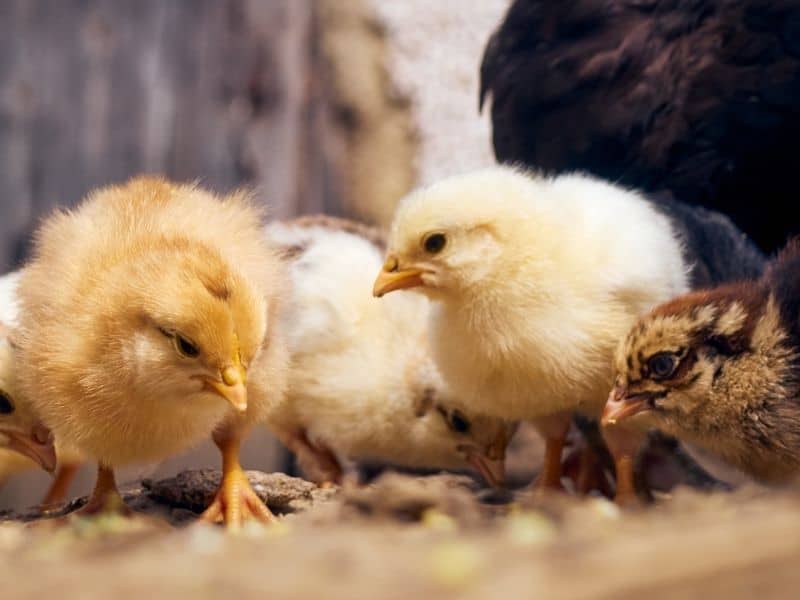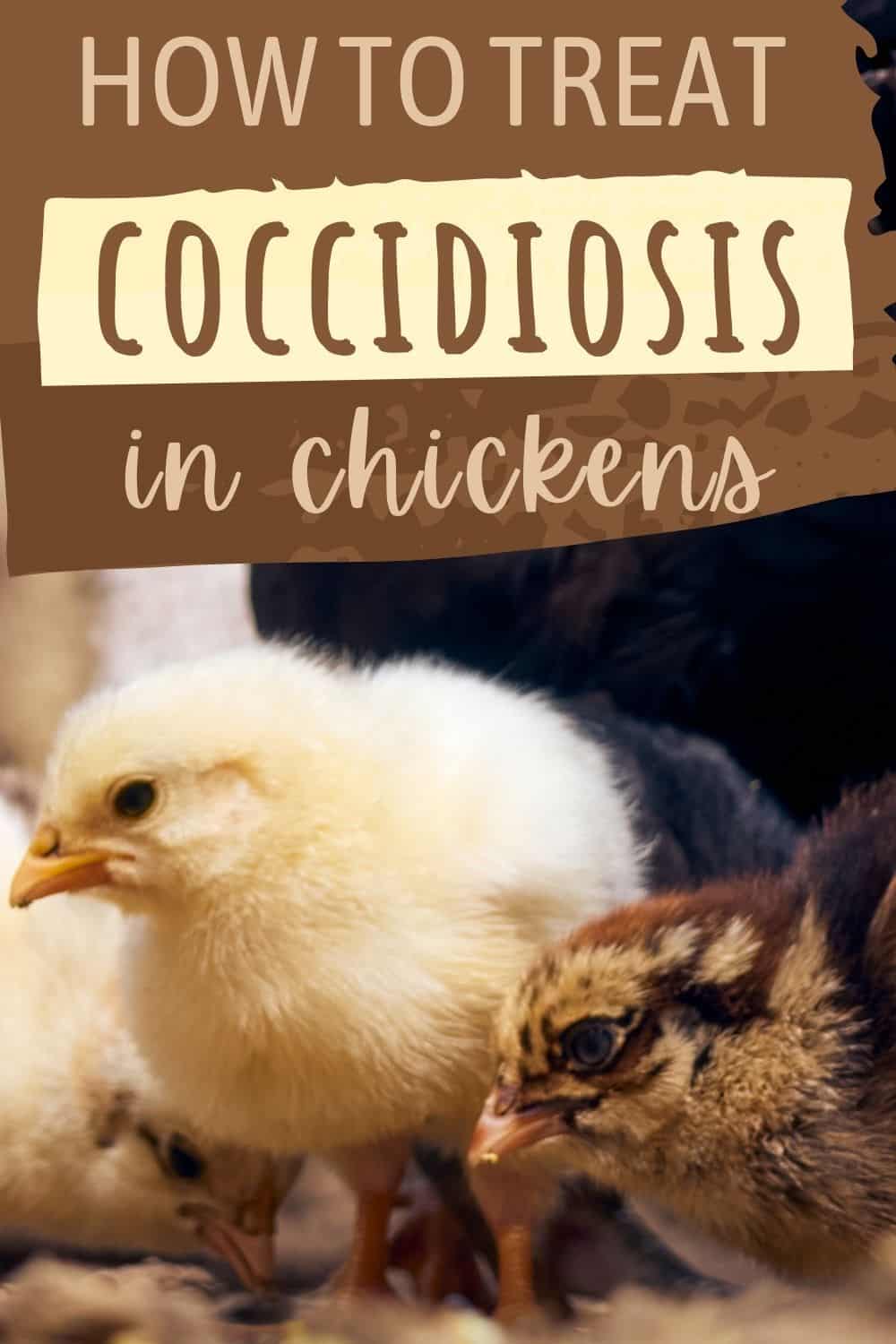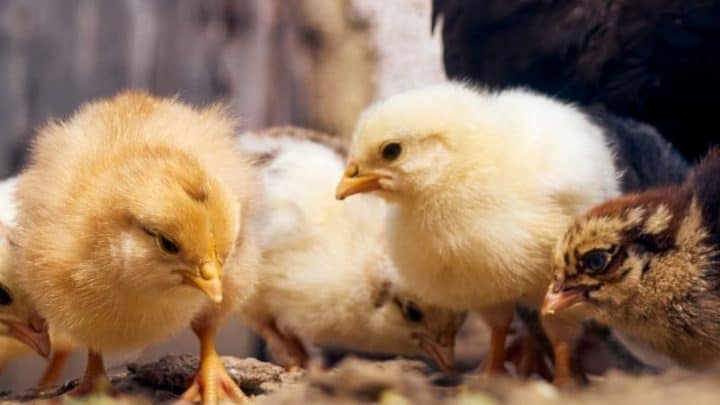If you are a new chicken owner and have been browsing the various chicken groups online, you’ve probably come across a few discussions on Coccidia in young birds. Let’s discuss coccidiosis in chickens: the causes, treatments, and cures.

If you’re new to raising chickens, and want to learn more, this book is a great start!
All You Need To Know About Coccidiosis in Chickens
What is coccidiosis?
Coccidiosis is a protozoan parasite found in the intestine of humans, birds, livestock, and domesticated animals. It is basically a parasite that attaches itself to the intestinal tract of a chick or young chicken between the ages of three weeks and four months. Once attached it forms an oocyst. The oocyst multiplies rapidly causing bloody stool, stunted growth, and death. It is natural for chickens to have a few coccidias in their systems, it’s when they begin to multiply rapidly that it becomes a problem.
What are the symptoms?
The most obvious sign of a coccidia infestation is bloody stool. Most times this will be accompanied by a bird that just seems off or sad. They will tend to puff up as if cold and not want to move around much.
Loss of appetite will follow and then rapid weight loss. They also will tend to isolate themselves from the other chickens and you may notice the comb and wattles have become pale. Some of these symptoms can also be attributed to other issues such as mites or lice and even dehydration, so you’ll want to be sure it is coccidiosis before you begin treatment.
Coccidiosis typically only affects young birds. As a bird matures its ability to maintain the parasite load increases, making it less susceptible to a full-blown infestation. Once a bird is a year of age, coccidiosis becomes less likely a cause of illness.
How do I treat my birds for coccidiosis?
Coccidiosis can take down a young bird fast. The key to successful treatment is catching it early. You will want to treat all birds in the enclosure whether they are showing signs or not.
There are two methods of treatment and you will hear strong arguments for and against each one. You’ll need to decide which method works best for you and your flock. I personally prefer to use sweet bleach. In all the years I’ve been raising birds it has never let me down.
Sweet bleach method
At the first sign of an outbreak, you will want to start to administer this solution to the exposed birds.
There are those who are opposed to this method because of the usage of bleach. I personally find it to work faster than Corid, which we will discuss in the next treatment option. It also takes less time to start working in the bird’s system which results in a quicker turnaround.
Here’s how you make sweet bleach: combine one capful of bleach with 1/4 cup sugar and a gallon of water. Make a fresh batch daily. Give it as the only source of water for two days. If the outbreak is severe you may need to treat for 3-4 days.
You will want to follow up with three days of electrolytes (this is a favorite of many chicken owners) and an additional five days of probiotics to encourage gut health and healing (try this one!).
Corid
Corid can be found at most farm and feed supply stores. It is labeled for cattle but can be used to treat chickens.
There is a powder and a liquid form. When using the powder you will add 1.5 teaspoons to a gallon of water, with the liquid 2 teaspoons to a gallon of water.
The active ingredient in Corid is Amprolium which is used specifically for the treatment of coccidia. Treat for five days, with a fresh batch of Corid water each day.
There is some argument as to how effective Corid is because of overuse. Treatment will be hard on their digestive system so you’ll want to follow up with electrolytes and probiotics as you would when using the sweet bleach method described above.
Rooster Booster Vitamins and Electrolytes with Lactobacillus, Natural, 8 oz. Fresh Eggs Daily Poultry Probiotics Chicken & Duck Feed Supplement 6LB
Fresh Eggs Daily Poultry Probiotics Chicken & Duck Feed Supplement 6LB
Coccidiosis prevention
Coccidia lives in the intestinal tract of chickens. It is released into the environment through fecal matter. Coccidia thrives in wet, warm environments. One of the best ways to prevent an infestation is to keep your runs and coop clean and dry.
Change out bedding frequently and don’t put water in the coop if your chickens are out in the run most of the time. This will prevent a damp, welcoming environment for coccidia in your coop.
During the rainy season keep a close eye on your younger birds to acclimate yourself to their habits and behavior. If anyone starts to look off, check for signs of possible coccidia infestation.
There is a vaccine for coccidiosis that can be given to chicks at the hatchery. Murray McMurray is one hatchery that will vaccinate for coccidiosis if it is requested by the buyer. The vaccine is essentially a spray that is applied once the chicks are boxed for shipment. You may also purchase a vaccine and give it yourself though I believe it is quite pricey.
Also, keep in mind that the vaccine is effective against the most common strains and does not cover all of them. Chicks vaccinated for coccidiosis should not be fed medicated chick feed.
Starting your chicks on a medicated feed that contains Amprolium can help to prevent the occurrence of coccidia in your young birds. This should only be fed for the first weeks of age as the Amprolium is a thiamine blocker and inhibits the absorption of vitamin B which chickens need to sustain healthy muscle function. Once you finish feeding medicated feed, supplement with a vitamin powder or pellets, such as Rooster Booster or Poultry Cell.
Sprinkling feed with a powdered probiotic can help to regulate and strengthen the gut which may help prevent an overload of coccidia in the intestines. This is my favored method for preventing coccidia.
Getting chicks acclimated to the outdoors early can also help in building up a natural resistance. Since cocci is found in the soil, getting chicks on the ground pecking and scratching will help to acclimate them to many bacteria early. This is key to building up immunity and why I believe hen-raised chicks are much stronger and hardier from the get-go. But that’s another topic.
Bottom line is to keep your areas clean and as dry as possible and treat at the first sign of illness for best results. Coccidia doesn’t have to be a death sentence: a little due diligence on your part can be the key to a successful experience should your birds be infected.
Frequently Asked Questions
My young chickens are showing signs of a coccidiosis infestation, should I treat the entire flock?
Treat only the young birds as your mature birds have already developed immunity and do not need treatment. Most birds over 6-8 months of age will not fall victim to coccidiosis because their gut has become accustomed to the parasite and is able to manage the load.
What is the best way to clean the coop and run to minimize the risk of a coccidiosis infestation?
Remove all litter and waste from the coop and spray the entire space with a solution such as Virkon S, a strong disinfectant that will eradicate any lingering parasites. For the run, keeping it dry and raked is your best line of defense.
What are the earliest signs of coccidiosis, what should I look for?
In the early stages, you may see a bit of bloody stool. You need to keep an eye on your bird’s droppings, especially the young ones. Bloody stool is a sure sign of coccidia. You’ll want to treat ASAP at the first sign of blood. As the parasite replicates and grows in number, you will see more bloody stool in greater volume, the bird will be lethargic and puffed up, standing away from the rest of the flock. At this point, the infestation is pretty severe and mortality is likely. Catching it early and treating aggressively is the key to besting coccidiosis.





7 Respiratory Diseases In Chickens And What To Do When Your Chickens Get Them
Monday 27th of March 2023
[…] How To Treat Coccidiosis in Chickens […]
Quick Guide To Raising Backyard Chickens
Thursday 28th of July 2022
[…] How To Treat Coccidiosis in Chickens […]